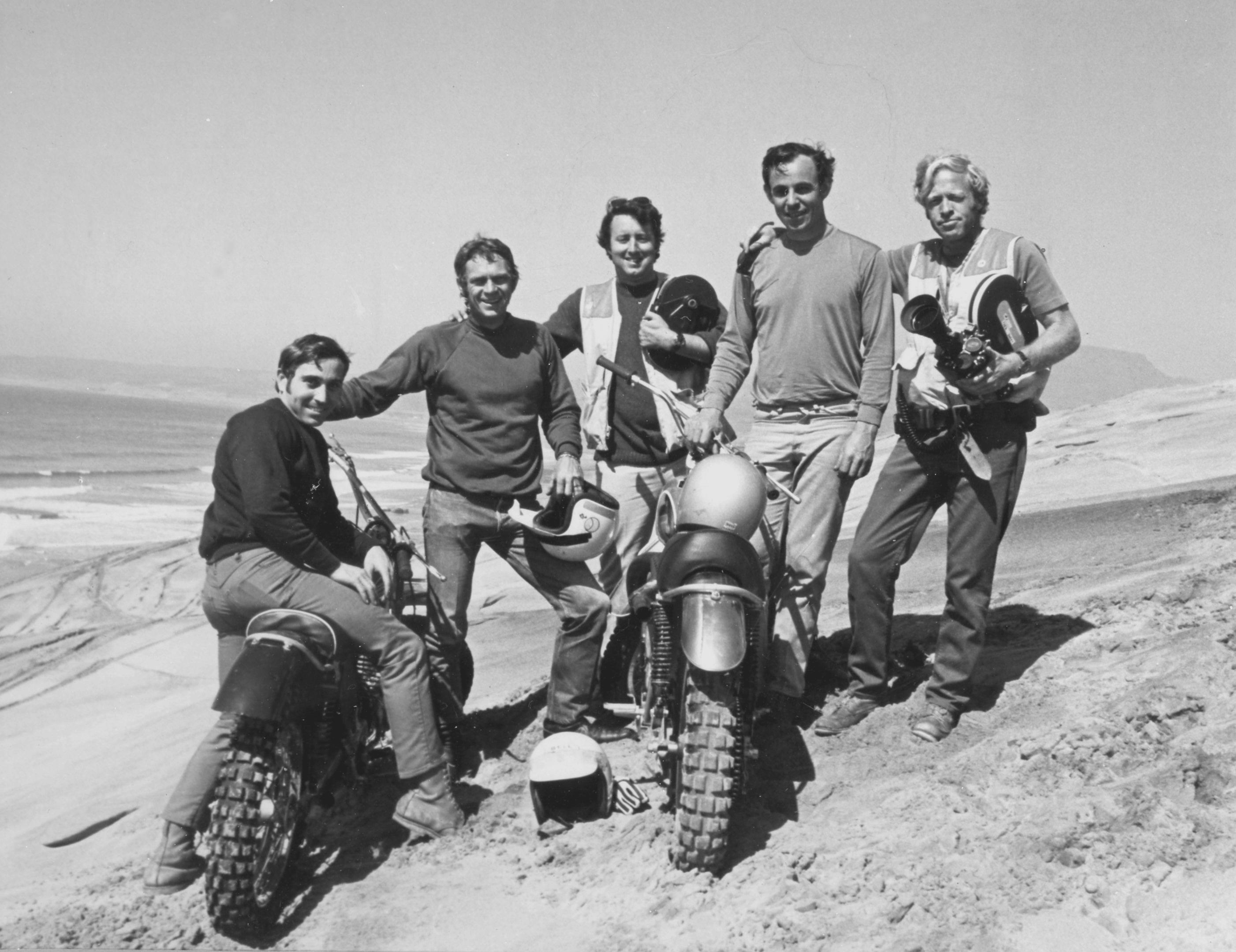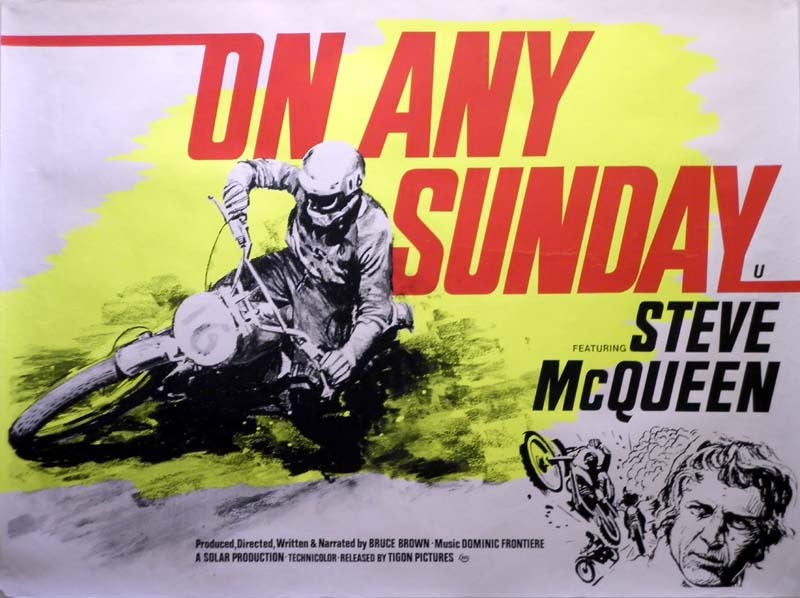" image via Lapoularde It's pretty obvious to anyone who has turned even half an analytic eye on bike culture that On Any Sunday is one of the most interesting, and certainly the most beautiful, films on bike culture that was "

Bruce Brown Interview
The great director on Motorbikes, McQueen and The Endless Sunday
Bruce Brown’s creative output has been defined by quality rather than quantity.
After making the era-defining surf movie, Endless Summer, in 1966, Brown followed up four years later with On Any Sunday, the most evocative film about riding motorcycles ever made. With its gorgeously saturated 16MM tones and the way it turned the lens on an open hearted, inclusive brand of motorcycling – the original film has become the foundation myth of the alt.bike scene.
The director, however, has always said he made movies simply so he could stay on the beach longer. For the subsequent five decades Bruce Brown has lived by that ethos – peaking above the parapet only rarely. We caught up with Bruce at the European release of his son Dana’s spectacular sequel On Any Sunday – The Next Chapter.

Influx: On Any Sunday is still regarded with such affection, why?
Bruce Brown: I don’t know. I have a hard time watching my old movies, but that one I look at and go, ‘Hey, that’s not too bad.’ Part of it is the people. I had a lot of respect for them. They were virtually my heroes and they’re all still good, good friends. I see them all the time. The motorcycle community is just a bunch of really nice people.
I:How did you come up with the vision for ON ANY SUNDAY, pulling all the disparate strands together?
BB:Well, I got into motorcycle riding late in life, in the mid-60s, about the time Endless Summer came out and thought, ‘boy, this is a lot of fun!’ Then I started going to Ascot for the flat track races, met some of the riders and I’d buy my motorcycles from Malcolm Smith and rode with him a little bit. I thought, Y’know, what a bunch of nice people. At the time motorcyclists had a bad rep because of Marlon Brando and the Hells Angels and all that, but it was totally not like that. I thought, How about making a movie about something other than surfing. I went to Steve [McQueen] and said, Hey I want to do something about motorcycles. He put up the money and he was going to be in it too, and I thought, well, that can’t hurt!
I:How easy was it to get Steve McQueen involved?
BB: Steve was on board from the beginning. I’d never met him before, but I obviously knew who he was. I called up to get a meeting and met him and told him what I wanted to do. He said ‘Cool, what do you want me to do?’ And I said, ‘Pay for it.’ He said, ‘Wait a minute, I make movies, I don’t finance them.’ So I told him, Well, you can’t be in my movie then, can ya? He laughed and said ‘Let me call you tomorrow.’ He called and said ‘Yeah, let’s go for it.’ So we just sent him a bills for the money we spent. It was a pretty good deal for him, because the distributor who sold the Endless Summer bought the distribution rights before the film was even half-done, so Steve got his money back before the film was even made.
I:You were saying he gave you some advice…
BB:When we were doing ON ANY SUNDAY Steve was working on the movie, LE MANS in France and he was having all kinds of trouble with the studio. He wrote me a really nice little letter, in pencil, on this really thin onion-skin paper, and one of the things he said in the letter, and underlined five times was, NEVER EVER GET INVOLVED IN A HOLLYWOOD STUDIO! I took that to heart and I never did.

I:You used helicopter shots and helmet cams while making ON ANY SUNDAY in 1970, are contemporary action sports filmmakers doing anything you didn’t do?
BB:I can’t really think of anything.
I:What the hell have they been doing for 40 years?
BB:[shrugs].Well, the helmet cam weighed 25lbs. We had two. What’s funny is we got the helmet and had to have the brackets put on. We got a large helmet, but almost all the racers were little guys, so we had about five stocking caps to put on. Originally nobody wanted to do it because it looked dangerous. So we started saying ‘Well, we’ll give you 100 bucks to wear it’, and everyone started lining up to wear it.

I:What do you think when your films are credited with helping start surf culture and the industry around it?
BB: Surf culture, I don’t even know what that is. Both sports, surfing and motorcycle racing, had a real bad reputation, the people being losers and all that stuff. So it changed the public perception of what these people are like. We started out making movies so we could stay at the beach and live the life we wanted to live, and [make movies] entertaining to the audience. We definitely started off at the grassroots.
I:Grassroots?
BB:We could go to Hawaii with $100 and live for a month. We could eat for 25 cents. I hear all this stuff about lifestyle and distribution. We printed our own posters and my wife ran the projector, we’d carry our own sound system and we’d rent a high school out and show the movie. At the end, we’d count out the dollar bills and go, Wow we just made $37.50! Or $2000 or whatever, but that just went to pay the bills and make the next movie. So I really take no credit for anything about action sports or lifestyle, because I didn’t know what the hell it was.
I:Has fun become too much of a business?
BB: I think so. So much of this new so-called action sports stuff has no story, it’s just a bunch of stuff going on. Both Dana and I wonder, ‘Well, what’s the story?’
There’s got to be a story to it, people involved. Humans.
CLICK TO ENLARGE










